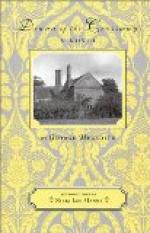‘She’s an old friend,’ said Redworth, composing himself; for the dose he had taken was not of the sweetest, and no protestations could be uttered by a man of the world to repel a charge of tattlers. ’The truth is, her book is clever. I have read the proofs. She must have an income, and she won’t apply to her husband, and literature should help her, if she ’s fairly treated. She ’s Irish by descent; Merion’s daughter, witty as her father. It’s odd you haven’t met her. The mere writing of the book is extraordinarily good. If it ’s put into capable hands for review! that’s all it requires. And full of life . . . bright dialogue . . capital sketches. The book’s a piece of literature. Only it must have competent critics!’
So he talked while Rainer ejaculated: ‘Warwick? Warwick?’ in the irritating tone of dozens of others. ’What did I hear of her husband? He has a post . . . . Yes, yes. Some one said the verdict in that case knocked him over—heart disease, or something.’
He glanced at the dark Thames water. ’Take my word for it, the groves of Academe won’t compare with one of our bridges at night, if you seek philosophy. You see the London above and the London below: round us the sleepy city, and the stars in the water looking like souls of suicides. I caught a girl with a bad fit on her once. I had to lecture her! It’s when we become parsons we find out our cousinship with these poor peripatetics, whose “last philosophy” is a jump across the parapet. The bridge at night is a bath for a public man. But choose another; leave me mine.’
Redworth took the hint. He stated the title of Mrs. Warwick’s book, and imagined from the thoughtful cast of Rainer’s head, that he was impressing the princess Egeria On his memory.
Rainer burst out, with clenched fists: ’He beats her! The fellow lives on her and beats her; strikes that woman! He drags her about to every Capital in Europe to make money for him, and the scoundrel pays her with blows.’
In the course of a heavy tirade against the scoundrel, Redworth apprehended that it was the cantatrice’s husband. He expressed his horror and regret; paused, and named the princess Egeria and a certain Critical Review. Another outburst seemed to be in preparation. Nothing further was to be done for the book at that hour. So, with a blunt ’Good night,’ he left Charles Rainer pacing, and thought on his walk home of the strange effects wrought by women unwittingly upon men (Englishmen); those women, or some of them, as little knowing it as the moon her traditional influence upon the tides. He thought of Percy Dacier too. In his bed he could have wished himself peregrinating a bridge.




